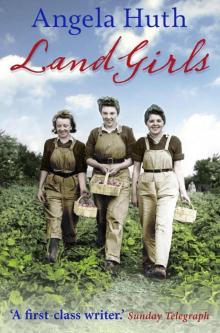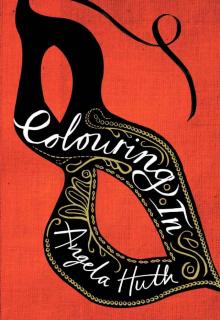- Home
- Angela Huth
Another Kind of Cinderella and Other Stories
Another Kind of Cinderella and Other Stories Read online
Another Kind of Cinderella and Other Stories
ANGELA HUTH
Contents
Another Kind of Cinderella
Dressing Up
The Day of the QE2
Mothers and Fathers
Laughter in the Willows
To Re-Arrange a Room
Alternative Behaviour
The Wife Trap
Squirrels
Mistral
Men Friends
Another Kind of Cinderella
‘Now come along, gentlemen, if you please,’ urged Lewis Crone, waving his baton. ‘What we want is a little more uplift in the last bar, don’t we? Up, up and away.’ ‘Stuff it, Lew,’ murmured Reginald Breen, second violinist, under his breath.
He dabbed at the sweat on his forehead with a large white handkerchief. It was bloody hot down here in the pit, even in winter. And he was damned if he’d give the last bar a lift. It wasn’t exactly Beethoven the Winterstown Concert Orchestra was struggling to bring some life to, after all. Just wallpaper music to fill the gap where the Fairy blooming Godmother turned the mice into ponies. They hadn’t half had some trouble with the ponies this year, what’s more – doing their business just at the wrong moment, and so on. Reginald sniffed.
‘So once again, gentlemen,’ the mighty Lewis, conductor with airs above his station, was saying. ‘We’ll take it once again, if you please.’
What’s the point, Reginald wondered, being this particular for this kind of show? Not a soul in the audience would notice whether or not there was a wretched uplift in the last bar. Half of them would be under twelve. The other half, pensioners’ outings, were plugged into hearing aids. For them a pantomime was no different from a silent film. He tucked his instrument under his chin, and turned with an exaggerated look of scorn to his friend, Tom, first violin.
‘Better give it the works,’ whispered Tom, ‘or he’ll keep us into the dinner hour.’
‘Righty-ho. Last time. Up, up and away.’ Reginald had perfected his mimicry over the years.
He and Tom lifted their bows in unison. Tom caught the conductor’s agitated eye. The orchestra crashed once more into the last few lines of forgettable music. Their sudden energy came from indignation. Lewis Crone had kept them at it since ten this morning. They were now hungry, bored and fed up with his absurd attention to detail. Trouble was, Lewis had once seen André Previn rehearsing an orchestra on television. Since then he had applied his own version of Previn’s methods to the WCO, causing much suffering and discontent. In the old days they’d played through the score a couple of times at the beginning of the season – Jack and the Beanstalk, Aladdin, Mother Goose, whatever – and that was it. Now, all this pernickety fussing was driving them to near rebellion. Most of the players – weary, professional men – had considered resigning, but none actually did so. There were not many openings for their class of musician on the south coast. Tom was the most vociferous in his complaints. Reginald encouraged him in his discontent, for Tom’s resignation would be to Reginald’s own benefit. Once Tom had gone he, Reginald, would surely become first violin. He had waited some thirty years for this position. Over and over again others, outrageously, had been placed above him – incompetent musicians, mostly, from outside the orchestra. And once, worst of all, a very junior ‘talented’ violinist from the WCO itself. He hadn’t lasted long: no stamina. Many times Reginald had suffered the humiliation of being passed over, and had kept his silence and his hope. He could not afford to resign.
The morning’s rehearsal over, Tom and Reginald made their way along the front. They exchanged few words: music was their only common interest. Proper music. Tom carried his violin case under his arm. Home, this afternoon, Tom would be practising the Mozart concerto. Reginald would be attending to his mother.
The sea breeze on their faces was good after the stuffiness of the orchestra pit. Reginald always enjoyed the short walk home. It refreshed him, gave him strength for the tasks ahead.
‘Still haven’t got the coach finished, I hear,’ said Tom.
‘Coach and beanstalk, it’s the same every year, always late.’ Reginald smiled at the thought of the familiar incompetence.
‘At least we’ll see Valerie in her spangles, tomorrow’ Tom was something of a woman’s man, keenly sensitive to the potential of leading ladies.
‘She’s as good a Cinderella as I can remember, I’ll say that.’ Reginald himself had been quite taken with her – what he could see from the pit – during the past month of rehearsals.
As the men parted, Tom paused for a last look out to sea. There was a small fishing boat on the horizon.
‘Give anything to be out there,’ he muttered, more to himself than to his friend. ‘Always fancied playing on the deck of a boat, up and down in time with the waves.’ He gave a small, helpless laugh. Reginald smiled in reply. He, too, had known fantasies that would never materialise.
He slowed his pace, once Tom had gone. He was always reluctant to return home and face that kind of music: but face it he must, as he told himself every day. If he didn’t hurry and buy his mother her paper there would be more to answer for.
‘Is that you, Reginald?’
The familiar peevish tone bit into his ears as soon as he was through the door. Who the hell do you think it is, he wanted to shout back. Who else would let themselves in at twelve fifty-five precisely, as he did five days a week?
‘It’s me, mother, all right,’ he called, and clenched his fists, taking a grip on himself before going in to the front room.
Mrs Breen sat in an armchair in the bow window. Her vastly swollen legs hung from widely parted knees, slippered feet not quite touching the floor. A mustard crochet cardigan – made in the days when she still bothered to sew the crochet squares together – covered a bosom so cumbersome she was unable to see her own hands in its shade. But the fingers (the worst kind of sausages, Reginald thought, among other savage thoughts) worked skilfully on their own, crocheting away, square after square, hour after hour. The furious, pale eyes, scowling on their ledge of fat purple cheek, were attending to some cooking programme on the television. Mrs Breen had not moved since Reginald had left her that morning. She was not able to move on her own. Her illness meant she was almost completely immobile, though Reginald had reason to think that on secret occasions, when she wanted something badly enough, she was able to reach it. Chocolates in the tin on the bookshelf, for instance. Their unaccountable disappearance, observed by Reginald on many occasions when his mother was in bed, could only mean one thing. But the time had not yet come to challenge her.
Her mauvish bulk backlit by the netted light from the window, Mrs Breen made no effort to drag her eyes from the television.
‘I fancy the Ambrosia today, Reginald,’ she said, ‘with that tin of plums you got last Friday.’
Incapable of shopping herself, her recall of exactly what her son had bought, when, was extraordinary. She would plan the life of half a pound of cheddar down to the last slice, insistent that only an ounce should be used for the sauce for the macaroni, and the merest scrapings for the Tuesday cheese supper with biscuits and tomatoes. Should Reginald miscalculate, and the cheese be finished before its allotted time, Mrs Breen would be moved to one of her famous rages when every blood vessel in her body enlarged, darkened, and threatened to burst through her glowering skin.
‘Anything else?’
‘Tin of curried spaghetti still there, is it?’
‘It is.’
Reginald’s heart pounded in relief. Last night he had had half a mind to eat it, but had resisted on the ground that he had had no energy to ask his mother’s permission.
‘Then I’ll have that.’
Reginald went to the kitchen to set about opening tins and preparing the tray. The room faced north. Any light that managed to challenge the old curtain at the window was diffused by the coarse-grained and very dirty net. A smell of disinfectant clashed with the smells of years of frugal meals. Opening the window was forbidden, so the air was never cleared. The kitchen gave Reginald a headache every day. He dreaded it. But there was no escape. How many years, now? Eight? Almost nine. And how many more . . .?
When he had placed his mother’s tray of lunch beside her, he returned to the kitchen. But he could not face either washing up last night’s supper dishes and the breakfast, or making himself a sandwich. Instead, he went out into the strip of ill-kept grass that was the back garden. When his father had been alive, herbaceous borders ran down both sides – borders that kept the old man’s every spare moment fully occupied. From the thin earth, he had managed to persuade a magnificent show of hollyhocks, tulips, dahlias (his speciality) – the lot. But Reginald could never be bothered with gardening. Everything had gone to seed, died off years ago. Now the lawn was bordered with weeds. But the apple tree, the single tree in the Breen family possession, still blossomed. And the blackbird still lived there. Reginald listened to its song now – vibrant, optimistic notes that gave him the courage to go on, sometimes. He lit a cigarette. Into his mind came a picture of Valerie, who in tomorrow’s dress rehearsal would be in all her finery at the ball. He looked forward to that. He found himself pecking quite fast at the cigarette, then grinding its stub under his heel with a force that surprised him. Valerie was the sort of girl, had things been different, Reginald might well have approached. He had no great ambitions concerning her, of course, even in his imagination. With the difference in their ages, marriage was naturally out of the question. No: all he wanted, or told himself he wanted, was a friend. Her funny crooked smile and short bouncy hair inspired him with exciting ideas of friendship. Perhaps one day he would summon the courage to speak to her, see how things went.
‘Reg! It’s time.’
Reginald allowed himself a moment’s more reflection, then returned to his mother. It was time for the dreaded visit to the bathroom, the ungainly negotiating of the dim passage, the old woman’s entire weight on his arm, her invective spewing in his ear. Then, the long afternoon. He would have liked to go to his room, have another go at the Tchaikovsky. But his mother could hear, she said, however quietly he played. It hurt her ears, all that screeching, she said – she had always wanted Reginald to go into insurance, like his father. The violin was forbidden in the house.
Instead of music, it would be shopping at the Co-op, hoovering the stairs, two hours of bad-tempered Scrabble, another tray for high tea, television, and the terrible ritual of putting Mrs Breen to bed. By the time Reginald went to his own room he was exhausted. Like a disobedient child, he would play his radio under the bedclothes for a while, very loud. This was the part of the day he most looked forward to. Much though he enjoyed his nightly blast of illicit music, it put him to sleep almost at once. On the noticeboard at the stage door it was announced that the transformation scene was the first to be rehearsed. Reginald felt a slight pricking of anticipation as he undid his violin case, took out the instrument and wiped its bow. The awkward notes of his fellow musicians, tuning up, usually filled him with gloom and unease as he faced the long morning of indifferent music ahead. Today the squawks of striving notes could not touch him. He tried out a few notes himself, tightened a couple of strings. He scarcely noticed Lewis Crone blundering up on the podium, cocky, grinning, one hand fingering a yellow tie.
‘Making a statement, what?’ whispered Tom, who was using a duster to polish his violin – a very superior instrument which could not have been better cared for had it been a Stradivarius.
‘Won’t get anywhere,’ replied Reginald. He had no idea why he made this comment, or if there was any truth in his speculation.
The stage lights were switched on, bringing life to the Ugly Sisters’ grim kitchen.
‘Idiot,’ yelled a voice from off-stage. ‘That’s the ballroom effing light.’
The peach light was dimmed, replaced by the kind of light usually glowing in the front room at Reginald’s house. No wonder Cinderella, shortly to be sitting by the giant fireplace, needed a Fairy Godmother. Reginald could have done with one most days himself.
Bev Birley, in fishnet tights and a short satin tunic, came striding on to the stage. Bev was Prince Charming. Last year she had been Jack, the year before Aladdin. Beginning to show her years, too, thought Reginald, noting the definite thickness of her hips. He had never liked Bev – not that he had ever had occasion to talk to her. But she was stuck-up, haughty, tongue like a whiplash to junior members of the cast, though all agreeable smiles to visiting stars. Between seasons, Reginald saw her sometimes in the town walking a terrier. Once, he recognised her picture in the window of an optician. She was wearing flyaway blue-tinted glasses and her hair had been stuck down with grease. She still did not look very nice. Presumably, not being in national demand, she had to do any job she could to keep herself going between seasons.
‘Anyone wanting me this morning?’ Bev shouted into the darkness of the auditorium, legs spread wide, hands on hips, her annual stance in every proposal scene. There was a slight titter in the orchestra pit. Tom nodded towards Reginald. Bev scowled.
‘No one wanting you till two, darling,’ the director called from the back of the stalls. ‘See you then.’
Bev stomped off.
‘Stuck-up bit, know what I’d like to do to her,’ whispered Tom.
Reginald had no time to imagine what this might be because Cinderella came on to the stage just then, wrapped in a large cloak. She wore a great deal of scarlet lipstick which made her crooked smile look very grown up. As Bev passed her, she whispered something that made them both smile, and ruffled her hair.
‘Cheek,’ said Tom.
‘Taking liberties, sucking up, usual thing,’ agreed Reginald.
‘Quiet now.’ Paddy Ever, the director – or Ever Anxious, as he was known – had moved forward to take command. He leaned over the pit and shouted up at the stage.
‘Why are we wearing a cloak, darling, in the kitchen?’
Cinderella, Reginald could see, looked confused.
‘Wardrobe said it was a cloak for this scene. Suppose I’m cold in this bloody great kitchen, no central heating.’
The musicians smiled among themselves. At the beginning of the day they were ready to respond to any kind of joke, no matter how feeble.
Paddy scratched his head. ‘I mean, would Cinderella suddenly be in a cloak? Why would she be in a cloak, now, but only in a dress in the last scene? Is it viable, is all I’m asking. Is it rational?’
Paddy’s worries were known to hold up proceedings, sometimes for ages. The musicians flicked their music, rested their instruments. They could be in for a long spell of problem-thrashing before Lewis requested their first chord.
‘Don’t be daft, Pad: cloak on, amazing quick change in the dark. Stands to reason.’
Paddy’s face briefly relaxed. Reginald did not envy him his job. ‘Balldress under . . . point taken, darling. But why the sudden lipstick?’
They could hear Cinderella sigh. ‘Can’t put lipstick on in the dark, can I?’
‘Righty-ho, lipstick on. Let’s go.’
The Winterstown pantomime was all a very different kettle of fish to the Palladium, Reginald thought, as he did every year.
The rehearsal began. Cinderella and the Fairy Godmother, a dear old thing who had been in panto for years and whose underarms, these days, swung as the wand waved, played the scene too far downstage for Reginald to see anything. He could only just hear Valerie’s sweet voice and strange emphasis. ‘Oh, godmother . . .’ He liked such original rendering.
It wasn’t till after the mid-morning coffee break that the musicians were required to play the few high notes wh
ose purpose, as Lewis so often explained, was to convey excitement. There was drama with the ponies, as usual: two nasty little Shetlands, hired at great expense from an animal psychiatrist, but who had minds of their own just the same. They refused to stand still, and laid back their ears warning what would happen should they be pressed to act against their will. One of them nipped young Andrew, the coachman. A part-time actor mostly out of work, Andrew proudly admitted he started off at the bottom year after year, but remained convinced that one day his moment would come. Trouble was, as he once confided to Reg, he was so nervous of the ponies, despite their small size, that it was all he could do to keep holding their reins, let alone think himself deeply into the part of the coachman. A lamp fell off the coach as soon as Andrew returned from being bandaged, and then the door wouldn’t open. ‘Bloody useless wand,’ snapped the old godmother, longing for her lunchtime Guinness as the carpenter hammered away at the door.
It was a morning full of laughs – the kind of morning that made up for so much of the aching boredom of the job. And at last Cinderella appeared alone in the spotlight, cloakless, dazzling in a dress of sequins splattered on to net. Reginald still could not see her properly: he would have to wait for her upstage number, I’m going to the ball, for that. As it was, the wolf-whistles and laughs from the stagehands – an old tradition at any leading lady’s first dress rehearsal – made him uncomfortable. For all its good humour, Reginald did not like the idea of Valerie in all her finery being laughed at.
At the lunch break, Reginald hurried out alone from the pit. He had to break the news to his mother – whose dinner was, thank God, provided by Meals on Wheels today – that there was to be an unscheduled rehearsal this afternoon, due to delays this morning caused by the coach and ponies. Her outrage was predictable. He would have to listen to ten minutes of abuse and insult – ‘If you were Sir Thomas blinking Beecham I might understand’ – before providing her with a calming glass of brandy and making his escape. Dreading the scene ahead, he barged clumsily round the corner that led to the stage door, and bumped into Valerie herself. She was still in her balldress. The sequins, in the poor winter light, looked asleep.

 Sun Child
Sun Child South of the Lights
South of the Lights Virginia Fly is Drowning
Virginia Fly is Drowning Of Love and Slaughter
Of Love and Slaughter Such Visitors
Such Visitors Once a Land Girl
Once a Land Girl Land Girls
Land Girls Colouring In
Colouring In Nowhere Girl
Nowhere Girl Monday Lunch in Fairyland and Other Stories
Monday Lunch in Fairyland and Other Stories Another Kind of Cinderella and Other Stories
Another Kind of Cinderella and Other Stories Invitation to the Married Life
Invitation to the Married Life Easy Silence
Easy Silence